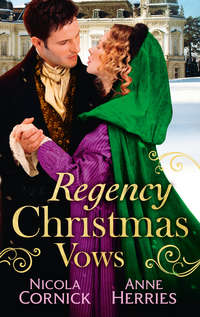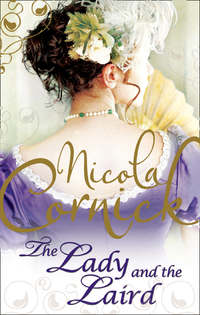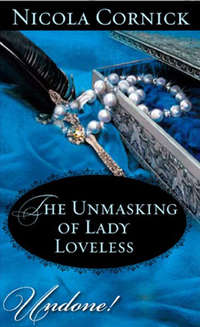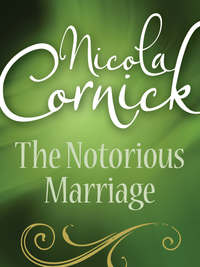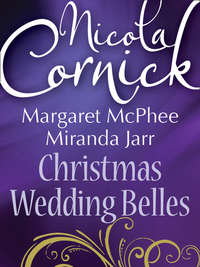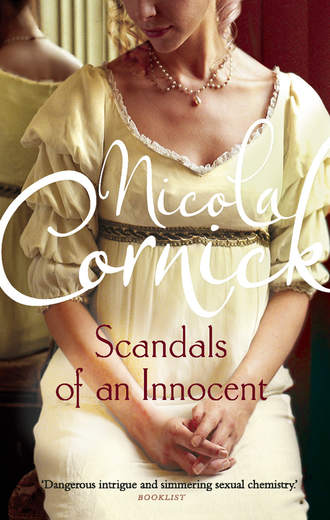
Полная версия
Scandals of an Innocent
“You should do,” the dowager said crossly. “Look at your cousin Freddie! Dead in a bawdy house fire and he had only been Marquis of Drummond for a twelvemonth!”
“Miles is more likely to die worn out by one of his mistresses, like Cousin William,” Celia put in waspishly.
“Thank you, Celia,” Miles said as Lady Vickery covered Philip’s ears. “I am duly warned and can only hope that I have more stamina or perhaps more discrimination in my amorous adventures than Cousin Billy had.” He sighed irritably. The family curse was something that he treated with absolute contempt. He had not been a soldier for eleven years in order to develop a superstitious fear of death. As far as he was concerned the Curse of Drum only related to the fact that his cousins had been profligate to a man and had left thousands of pounds owing to the moneylenders.
“Miles, you are a disgrace,” his mother said reproachfully. “I am sure that your poor papa would be turning in his grave to hear you speak thus.”
“Papa did not have to be dead to disapprove of me,” Miles said evenly. “He would probably feel that the inheritance of Drum was my just deserts for a misspent life. No doubt he would say it was a judgment on me.”
Lady Celia stifled a laugh. “Papa was very keen on hellfire and damnation,” she said.
“As was appropriate for so eminent a man of the cloth,” Lady Vickery pointed out, smoothing the widow’s weeds she had worn for the past five years, since her husband had died. In the pale winter light she looked delicate and artfully pale, the epitome of the grieving widow. Miles’s father had been a younger son who had gone into the church, had unexpectedly inherited his brother’s barony and had risen to become Bishop of Rochester. The presence of the beautiful, high-born, gracious Dorothea at his side had done much to ensure his preferment and it was frequently said that His Grace would have reached the dizzy heights of the See of York or even Canterbury if only he had not died relatively young.
“Oh, we all know that Papa was all that was appropriate for a bishop,” Lady Celia said, with an edge to her voice that made Miles look at her closely. She did not meet his eyes but fidgeted with the stitching on her cuff. “He was an example to us all.”
“Celia, a little respect, if you please,” Lady Vickery said in a fading voice. “I know that you and your father had your differences, but Aloysius is dead.”
Celia made a small sound of disgust. Looking at her, Miles could see pity as well as impatience in her eyes as they dwelled on their mother’s tragic, piquant face.
“Mama,” Celia said, “it is Papa’s fault that Miles is in such desperate financial straits. Had he not been so extravagant, Miles would not have two cursed inheritances to contend with rather than one—”
Lady Vickery gave a little cry of distress and her daughter fell silent as the lacy handkerchief was applied again.
“Your papa was a good man.” Lady Vickery sniffed. “I will not hear another word against him, Celia! Do you hear me? He did his best for us all.”
There was an awkward little silence in the room. It was generally known within the Ton as well as within the Vickery family that the late bishop had been a deplorable spendthrift, just as Celia had said. He had entertained on a lavish scale and had not understood the meaning of the word retrench even when the bailiffs were at his door. Lady Vickery, Miles knew, tried to forget this regrettable aspect of her late husband’s character and had unofficially canonized him. As for the rest of the late Lord Vickery’s sins, they had been hidden so deep that no one would ever uncover them. Miles was aware that he was the only person who knew of his father’s transgressions.
He knew because he was the one who had taken the blame.
The anger stirred in him again, dark, painful and poisonous. He had worked so hard to lay those memories to rest along with his father. He would not allow them to be exposed now. It was ancient history, dead and buried. There was nothing that could be done to right old wrongs.
Mr. Churchward cleared his throat very loudly. The tips of his ears glowed bright red, a sign of his extreme discomfort on hearing family squabbles rehearsed before him.
“Returning to the Curse of Drum, my lord,” he said. “I do believe that you should treat the tales with a little more circumspection.”
Miles raised his brows. “I would not have expected you to indulge a belief in superstition, Churchward,” he drawled. “You are a man of the law, a believer in evidence and reason.”
Churchward blushed rather endearingly. He removed his spectacles and polished them agitatedly. “The empirical proof is too strong to ignore, my lord,” he said. “Sixteen marquises dead in less than one hundred years—”
“All dying in violent and horrible ways.” Lady Vickery shuddered, whilst Philip looked rather excited, as though he wanted the details.
“The result of no more than excessive carelessness,” Miles said. “You know our cousins were the most reckless, foolish and generally decadent of men.”
“But once the curse has taken you…” Churchward said unhappily.
“Philip will be next in line for the marquisate,” Celia Vickery finished, her words dropping into the room like pebbles down a well.
This aspect of the situation had already occurred to Miles although he wished that his sister had not made it quite so explicit. The Dowager Lady Vickery was looking stricken now, and Miles felt impatient to see his mama’s distress. She cared too much, that was the problem. She cared about their father’s reputation, she cared desperately about Philip’s future, she cared about the loss of Drum, and she even cared about him with a fondness Miles found inexplicable and utterly unwelcome. Looking at Philip’s youthful, clear-cut profile, Miles felt some emotion stir within him and dismissed it abruptly. It was too late for him to have any feelings of love or affection or even obligation toward his family. Old memories and emotions rose in him and he slammed the door on them, trapping them in the dark recesses of his mind. He wanted no love from his family now. He had lost them all when he had been eighteen, and it was too late to heal the breach. He would pack his mother and siblings off back to the South as soon as he could. They had, at least, been offered the sanctuary of a grace-and-favor cottage on a cousin’s estate in Kent so he need not worry that they would starve. They lived in vastly reduced circumstances, they were poor relations, but at least they were not begging on the streets.
“Mr. Appleby,” Philip said importantly, “is of the opinion that a belief in superstition is no more than a demonstration of an ill-educated mind.”
“Your tutor is a man of great wisdom,” Miles said. “I am glad to think that you are not in the care of a superstitious fool.”
“But we must make sure,” Lady Vickery protested. “We cannot afford to take any risks!” She sat forward in her seat and grabbed hold of Philip’s hand in what she clearly thought was a reassuring grip. “The only solution is for you to marry at once, Miles. I know that you have always been most resistant to the idea of matrimony, but it is your duty to provide an heir immediately in order to save your brother!”
“A charming thought, Mama,” Lady Celia murmured. “Miles can ensure the succession of another hapless sacrifice to the Curse of Drum.”
Miles smiled at her. “On past experience I do not think that one son will be enough, Mama,” he said. “Drummond needs an heir and several spares before Philip is safe. Look how many of our cousins have been cut down in the past.”
“Pray do not joke about it, Miles,” his mother said, her lip quivering piteously. “You always had a most lamentably odd sense of humor.”
“Your mama does have a point, my lord,” Mr. Churchward said. “It would be extremely advantageous for you to marry, and preferably to an heiress. Leaving aside the so-called curse, that would at least buy you time and stave off the most pressing of the moneylenders—”
He broke off as there was a loud ping from one of the springs in his wing chair. “I do beg your pardon,” he added. “This chair is particularly uncomfortable.”
“The furnishings here are all ghastly,” Lady Celia agreed, looking around the high-ceilinged room with deep disapproval. “The first thing that Miles should do is to have a bonfire.”
“Can’t do that,” Miles said. “When I say we have to sell everything, Celia, I mean everything, down to the last stick of firewood and the last chamber pot.”
Once again there was a silence. Lady Vickery fidgeted with her gloves. She looked pained, as though she had swallowed a fish bone. Celia’s firm expression softened slightly.
“I am sorry, Miles,” she said. “First Vickery Place, then Vickery House and now this! You must feel dreadful—”
“It can’t be helped,” Miles said briskly. Celia’s sympathy was the last thing he wanted. He did not need her pity. He looked at his mother’s pinched, white face. She was aware that he would forever be remembered as the man who had sold Vickery and sold Drum, too, the reckless, extravagant marquis who had brought the family fortunes so low that they were in the dust. It was unfair that he would take the blame for the extravagance of others but Miles was blisteringly aware that life was never fair. He had learned that lesson at eighteen when he was banished by his father for bringing the family honor low. Since then he had taught himself to care for nothing.
A knock resounded through the castle, the sound echoing off the stone of the walls and bouncing back to assault the eardrums. Lady Vickery winced.
“I believe that will be Frank Gaines, of Gaines and Partridge, the Skipton law firm,” Miles said. He looked at Mr. Churchward. “I asked him to join us to discuss the very matter you touched upon, Churchward—the business of my marriage.”
Lady Vickery gave a squeak of excitement. “Oh, Miles, you good, good boy! I knew you would not stand by and see your brother taken by the family curse!”
“This has nothing to do with the curse, Mama,” Miles said harshly, “and everything to do with my need to marry money very quickly indeed.”
“I will answer the door,” Lady Celia said practically, rising to her feet, as the knocker thudded again.
“Celia, no.” Lady Vickery was appalled. “That is what the servants are for.”
“Miles has no servants, Mama,” Celia said. “Have you not been attending? He is ruined, in Queer Street.” The knocker sounded a third time and she frowned. “Good gracious but Mr. Gaines is an impatient man.”
“Thank you, Celia,” Miles said as she headed for the door.
His sister dropped him a curtsy laced with irony and left the room. Whilst she was gone, Miles leaned an arm along the top of the stone mantelpiece—which needed a good clean and left a line of dust on the sleeve of his jacket—and reflected how uncomfortable the other occupants of the room looked. Philip was fidgeting and looked thoroughly bored to be so confined. Miles wished his mother had left Philip in London with his tutor. The boy should really be at school, but Miles could no longer afford to pay for his brother’s education and had only been able to afford the services of Mr. Appleby because he was a distant connection of the dowager and had grudgingly offered to reduce his fees out of family feeling. It was something, Miles thought, when even the tutor was patronizing his poor relations.
Lady Vickery, meanwhile, looked as though she was sitting on a bed of nettles. Clearly the news of Miles’s imminent betrothal had excited her considerably and she could not wait to hear the details. She huddled on the sofa in her winter pelisse, holding her hands out toward the fireplace in a vain attempt to get warm. In this drafty medieval castle it seemed almost impossible to build up any heat at all. The stone fireplaces were all broad enough to house an army, and the fire that Miles had coaxed into life in the red drawing room today could not be felt beyond a radius of three feet.
Mr. Churchward shuffled his papers again for no particular reason and cleared his throat simply to break the silence. He looked as though he would be happier taking refuge behind a desk and preferably one a long way away from this shabby castle with its uneasy atmosphere. He, too, was a man who preferred the bustle of city life, and Miles knew that the isolation and harsh beauty of these Yorkshire hills was not to everyone’s taste, particularly in winter. And then there was Drum Castle itself, which seemed so different from Miles’s childhood memories. He had spent a great deal of time here in his holidays from Eton, for his cousin Anthony had been an almost exact contemporary of his and the castle had rung with sounds of their martial games. Miles was not remotely superstitious, but even he was forced to admit that there was something strangely oppressive about these dark rooms now, crisscrossed as they were with spiders’ webs and trails of dust. Drum Castle seemed positively Gothic now, weighed down by its heavy furnishings and by the dark curtains that closed off the dusty windows. Today, with the wind lifting the hangings from the old stone of the walls and making the building creak and groan, it felt like a castle in a nightmare. Really, Miles thought, one would hardly need a family curse to send one demented in a very short space of time.
Конец ознакомительного фрагмента.
Текст предоставлен ООО «ЛитРес».
Прочитайте эту книгу целиком, купив полную легальную версию на ЛитРес.
Безопасно оплатить книгу можно банковской картой Visa, MasterCard, Maestro, со счета мобильного телефона, с платежного терминала, в салоне МТС или Связной, через PayPal, WebMoney, Яндекс.Деньги, QIWI Кошелек, бонусными картами или другим удобным Вам способом.




